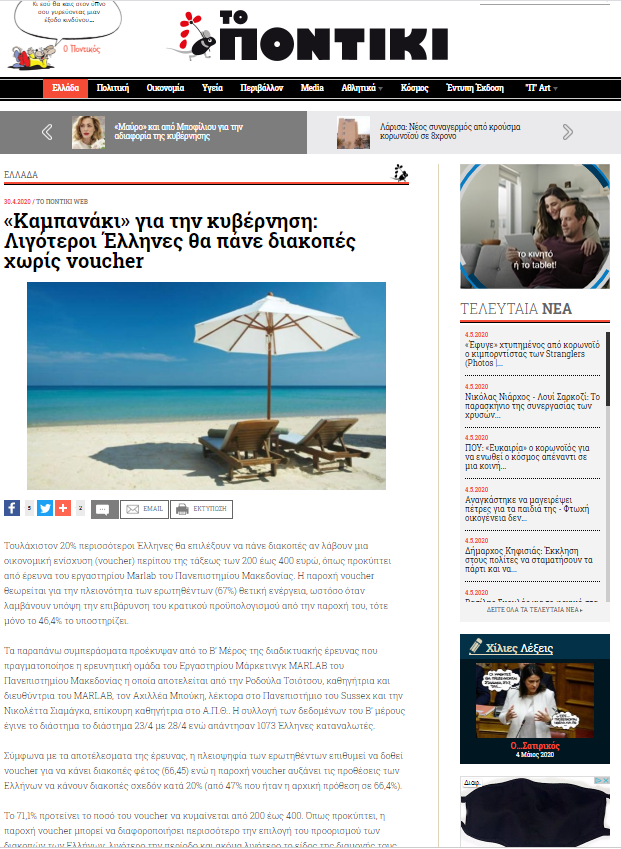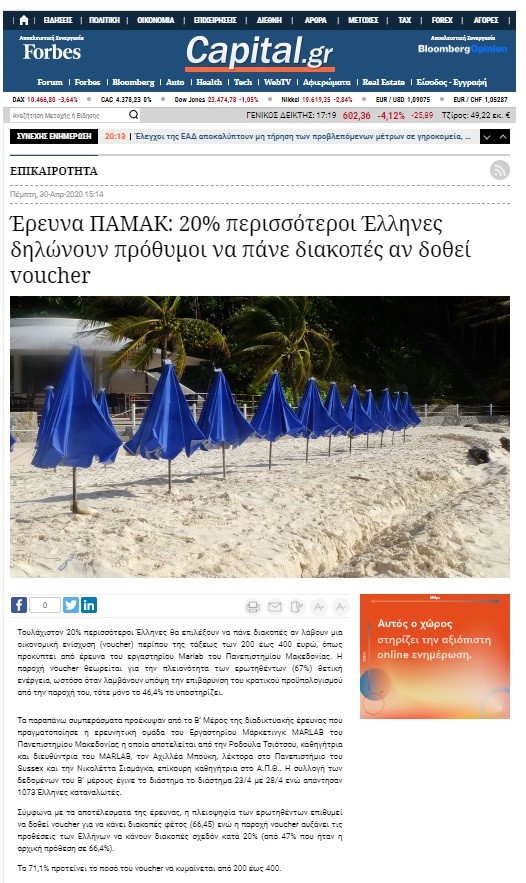The health crisis due to COVID-19 and its effects on declining incomes have led to the cancellation and large reduction in tourist bookings in all holiday destinations. Therefore, a major challenge for travel agencies and tourism businesses is planning for the upcoming touristic season, including decisions on the starting date of the touristic season with the release of flights, the number of employees, and the planning of services so that to comply with any new health safety measures for tourists. Due to the pandemic, it seems that domestic tourism may be an oasis of hope for tourism businesses in the desert of canceled bookings of foreign tourists. What are the expectations of Greek consumers for their holidays this year and what strategies can be used to motivate Greeks to spend their holidays in Greece?
Part ΙΙ of the online survey conducted by the research team of the marketing laboratory, MARLAB, at the University of Macedonia, which consists of Ms. Rodoula Tsiotsou, Professor and Director of MARLAB, and the research associate-members, Ms. Nicoletta Siamaga, Assistant Professor of Aristoteles University, and Mr. Achilleas Mpoukis, Lecturer at the University of Sussex, attempted to answer these critical questions. The data collection of the second part took place between 23/4 and 28/4 while 1073 Greek consumers responded.
MAJOR RESEARCH CONCLUSIONS:
- The majority of Greeks would like to receive a vacation voucher this year to go on holiday (66.4%)
- The provision of a voucher increases the intention of Greeks to go on vacations by almost 20% (from 47% to 66.4%)
- The recommended amount of the voucher is from 200 to 400 Euros for 71.1% of the sample
- Providing a voucher can mostly diversify the choice of Greeks’ holiday destination, however, it influences less the period, and even less the type of accommodation.
- The provision of a voucher is considered a positive action for 67% of Greeks; however, when they take into account the burden of the state budget from this provision, then only 46.4% support it.
- The majority of Greeks expect hotel prices to fall while they believe that restaurant prices will remain the same during their summer holidays.
- 75% of Greeks experienced a small to a large decrease in their income due to COVID-19
WILL THE GREEKS GO ON VACATION WITH OR WITHOUT VOUCHER?
When asked if they plan to take a vacation this summer, 47% said yes, 34% said they have not decided yet, and 19% said they don’t intend to go on vacations.
With the phrase “If I received a holiday voucher from the Greek state, then I would definitely go on vacation in Greece”, 66.4% of the respondents completely or largely agree, while only 9% of them disagree with it. However, it is noteworthy that 24.6% of respondents are unsure even in this case.
Perceptions about the amount of holiday voucher vary among respondents. 14.5% states that the amount of 200 Euros would be satisfying, 33.4% of the respondents consider that a voucher of 300 Euros is good enough, while 23.2% consider that this voucher should be in the amount of 400 Euros. Lastly, 23% of the respondents believe that the amount should be higher and specifically reach 500 Euros.
Holiday vouchers for domestic tourism are likely to change the final choice of the holiday destination for 66.3% of the respondents, 25.6% will be affected a little or very little while only 8.1% of the respondents state they will not be affected at all. The voucher is very likely to change the choice of the holiday dates for 55.4% of the respondents, while 32.3% of them claim that they will be affected a little or very little. Finally, 12.3% of respondents claim that their final choice for the holiday dates will not be affected at all by a vacation voucher. The trend here shows that the vacation voucher is more difficult to influence the choice of the holiday season than the holiday destination, which may be due to other exogenous factors (e.g. the possibility of taking days off from work). The voucher for domestic tourism is likely to change the choice of accommodation for 50% of the respondents; it will slightly affect 28.8% of the sample while 21.2% of the respondents claim that their final choice of accommodation will not be affected at all. The trend here shows that the vacation voucher is more difficult to influence the choice of accommodation in comparison to the destination, which may be due to other exogenous factors (e.g. health safety reasons).
The next question was about their attitude towards vacation vouchers. 67.2% of the sample is positive with the provision of a vacation voucher to boost domestic tourism in the country, 24.5% are unsure while only 8.3% disagree with this. When the question was differentiated and the effect of the voucher on the state’s budget was added, the answers varied. 46.4% continued to support the vacation voucher provision, 33.2% were unsure, and 20.4% became negative to the distribution of the voucher. When participants were asked if their family income has been negatively affected by COVID-19, 24.8% said no, 22.6% said yes up to 15%, 21.4% said it was affected with a reduction between 15 and 30%, 15.8% had an income reduction between 31 and 50% and for the 15.4% of the respondents their income reduction exceeded 50%.
THE EXPECTATIONS OF THE GREEKS FROM TOURISM BUSINESSES
The survey participants were asked as well about their expectations of tourism businesses in terms of prices. Interestingly, the majority of respondents (53.8%) expect that accommodation prices will be lower to some extent, while 31.6% of the sample believe that they will be approximately the same. Only 14.6% expect prices to be higher than last year. In contrast, 56.2% of respondents expect restaurant prices to be about the same. It is worth mentioning that 23.8% expect to pay less than last year for food while 20% expect prices to be higher.
SAMPLE PROFILE: 1073 people responded to the questionnaire, from which 31% were men and 69% women. In terms of age, 62% of the sample was between 20 and 40 years old, 34% was between 41 and 65 years old, and the remaining 4% was under 20 years old. 40% of the sample was married, 53% was single, 6% was divorced and 1% was widowed. In terms of income, 26.5% declared income less than 10,000 Euros, 33.6% between 10,001 and 20,000 Euros, 22% between 20,001 and 30,000 Euros, 10.4% between 30,001 and 40,000 Euros and the remaining 7.5% declared an income higher than 40,001 Euro. The sample was nationwide, coming from 47 different prefectures in the country.
The results are available in Greek here https://www.uom.gr/8075-ereyna-marlab-voucher-diakopon-gia-th-sthriksh-toy-esoterikoy-toyrismoy-ti-lene-oi-ellhnes
INDICATIVE PUBLICATIONS IN PRINT MEDIA
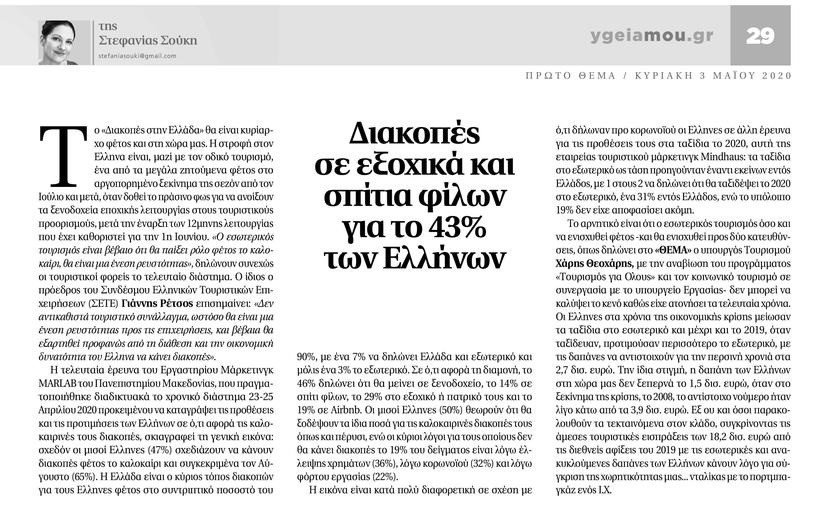
INDICATIVE PUBLICATIONS IN DIGITAL MEDIA
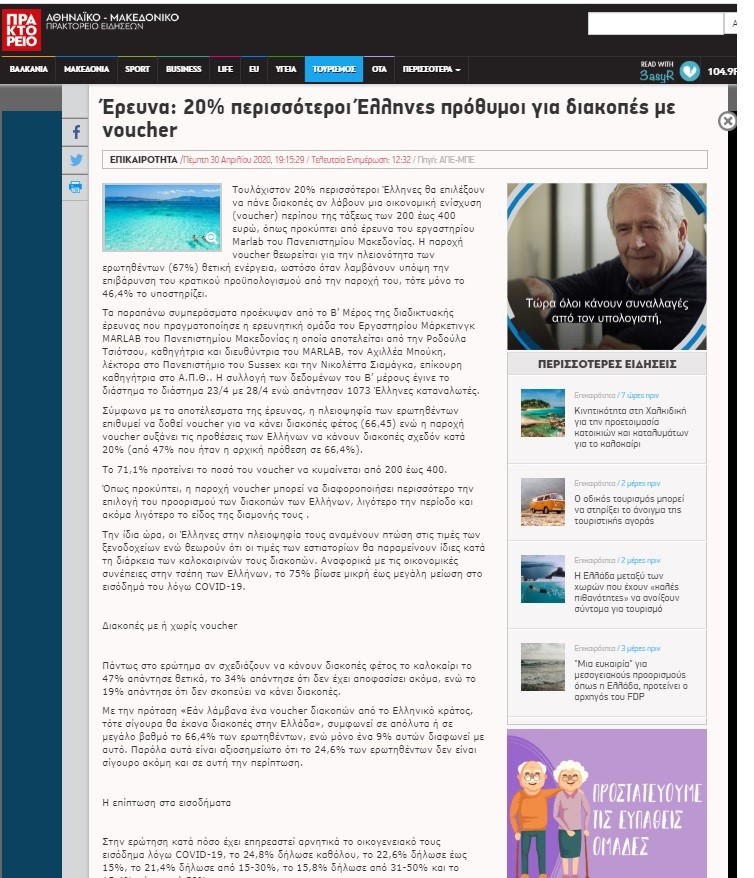
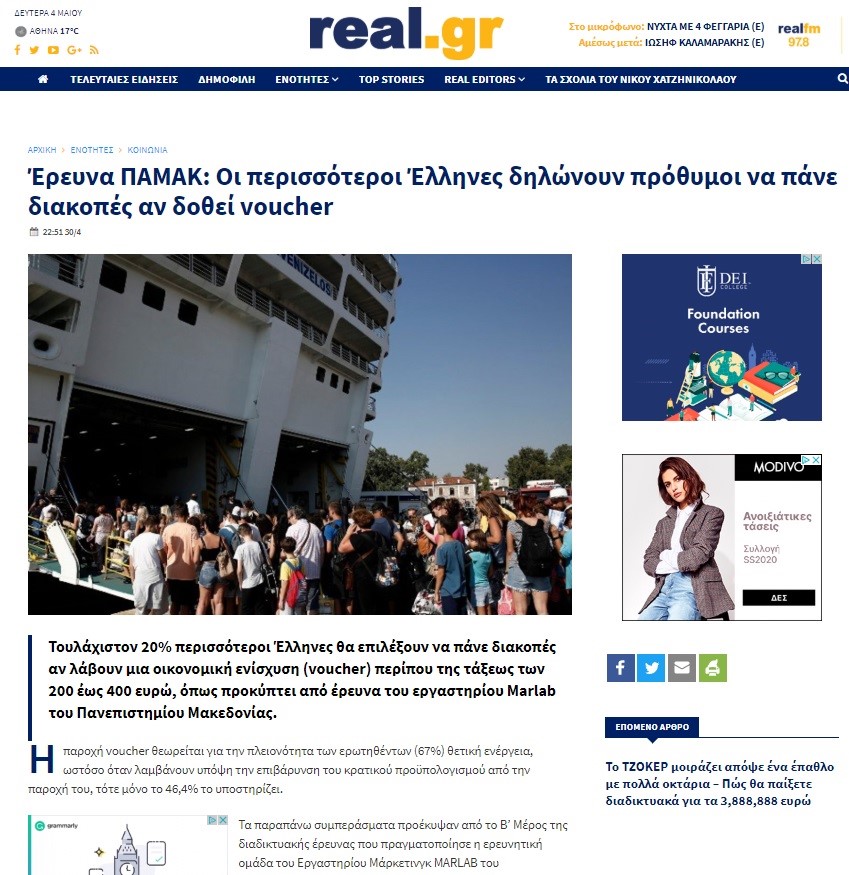
VIDEO OF INDICATIVE INTERVIEWS AND TV REPORTS (more videos are available on MARLAB’s YouTube channel)
